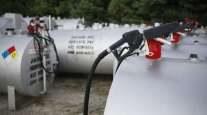Diesel Drops 14.9¢ to $4.353 a Gallon
By Frederick Kiel, Staff Reporter
This story appears in the Aug. 18 Print Edition of Transport Topics.
The national diesel average declined 14.9 cents last week to $4.353 a gallon, the fourth straight drop that has lowered the price of trucking’s main fuel by 41.1 cents a gallon, the Department of Energy reported.
The average regular gasoline price also fell by 7.1 cents to $3.809 a gallon, DOE said after its Aug. 11 survey of fueling stations. It was the fifth straight decline that has cut 30.5 cents a gallon from its record high of $4.114, set on July 7.
The price of diesel set its latest record on July 14 at $4.764.
“Retail prices have fallen from a combination of horribly low demand for the product and falling crude prices,” Phil Flynn, senior energy analyst at Alaron Research, told Transport Topics. “Gasoline demand will be the lowest in decades, and with diesel prices so high, truckers have been conserving fuel or parking their trucks.”
The decrease in diesel was the largest weekly decline since Oct. 31, 2005, when diesel dropped 28.1 cents to $2.876 a gallon.
The average fell in every region in the country, DOE said. Diesel fell the most in California, part of its West Coast region. Though that average dropped 17.4 cents to $4.607 a gallon, it is still the highest price in the nation.
The recent declines “definitely help carriers big time, because they can now make money on fuel surcharges that are adjusted weekly,” Chris Brady, president of Commercial Motor Vehicle Consulting, told TT. “Just like they got crushed when prices were going up, they can make some back, though . . . oil has to go down a lot more to really help the industry.”
U.S. truckers paid $309 million less for diesel and $86.9 million less for gasoline last week than when both fuels hit their respective highs in July, based on consumption figures estimated by American Trucking Associations of 752 million gallons of diesel and 285 million gallons of gasoline each week.
However, diesel is still $1.506 more expensive than a year earlier and gasoline is $1.039 higher.
“The price drop has got to help every trucking company,” said Joe Cowan, president of Cowan Systems, Baltimore, No. 99 on the Transport Topics 100 list of the largest for-hire carriers in the United States and Canada. “It’s had a good effect for us.”
Jon Issacson, chief executive officer of Central Refrigerated Service, West Valley City, Utah, and No. 67 on TT’s for-hire list, agreed.
“Obviously, it’s going to be a positive,” Issacson told TT. “It doesn’t hurt as much as a month ago, but prices are still too high and still too painful.”
Meanwhile, despite the outbreak of armed conflict between Russia and Georgia, a former Soviet Socialist Republic, crude continued its recent downward slide, with futures closing at $113.07 a barrel on the New York Mercantile Exchange on Aug. 12, more than $5 a barrel lower from the previous week. Crude closed at a record $145.29 on July 3.
The American Petroleum Institute said in an Aug. 13 report that U.S. oil demand declined to a five-year low from January through July, compared with the same seven-month interval over the previous years.
“Changes in consumer behavior have essentially erased five years of growth in gasoline demand,” API statistics manager Ronald Planting said in the report.
That same day, the Department of Transportation said Americans drove 12.2 billion fewer miles in June this year than June 2007. Since last November, Americans have driven 53.2 billion miles less than they did over the same period a year earlier — topping the total decline of 49.3 billion miles in the 1970s, DOT said.
Douglas Hinton, petroleum industry analyst for EIA, said although gasoline demand is falling faster than for diesel, the price for trucking’s main fuel was dropping faster.
“Diesel has been selling at such a premium over gasoline for a long time that it had a higher threshold to fall from,” Hinton told TT. “Falling crude has been the reason that both diesel and gasoline are dropping, but diesel had more fluff in it.”




